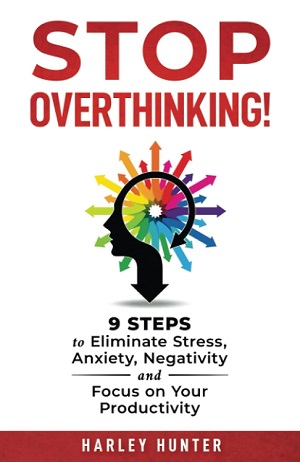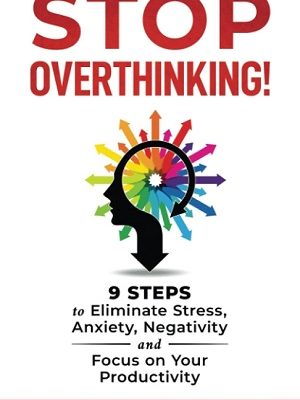Stop Overthinking!: 9 Steps to Eliminate Stress, Anxiety, Negativity, and Focus on Your Productivity by Harley Hunter is a practical guide that offers actionable strategies to help readers break free from the cycle of overthinking, reduce stress, and improve productivity. Below are lessons from the book:

Read: Stop Overthinking by Nick Trenton
1. Understanding the Root of Overthinking
The first lesson in the book focuses on identifying the root causes of overthinking. According to Hunter, overthinking is often a result of unresolved stress, anxiety, and a constant need for control. He explains that understanding where these patterns come from is essential to begin the process of overcoming them.
Key Lesson: Identify the Triggers of Overthinking
- Lesson: Overthinking is often triggered by uncertainty, fear, and the desire to control every outcome.
- Takeaway: To stop overthinking, you must first identify the underlying causes—whether it’s a fear of failure, self-doubt, or perfectionism.
- Actionable Tip: Keep a journal and write down the situations that cause you to overthink. This will help you recognize patterns and triggers.
2. The Importance of Mindfulness
Hunter introduces mindfulness as a powerful tool to combat overthinking. By practicing mindfulness, you can bring your attention to the present moment, thus stopping your mind from spiraling into unproductive thought patterns.
Key Lesson: Practice Mindfulness to Stay Present
- Lesson: Mindfulness allows you to become aware of your thoughts and feelings without getting trapped in them.
- Takeaway: By focusing on the present moment, you can prevent yourself from ruminating about the past or worrying about the future.
- Actionable Tip: Start your day with a short mindfulness exercise—focus on your breathing for 5 minutes, noticing each inhale and exhale to ground yourself.
3. Break the Cycle of Negative Thoughts
A major focus of the book is learning how to break the cycle of negative thoughts. Hunter emphasizes that overthinking often stems from a loop of self-critical or negative thoughts, which amplify stress and anxiety.
Key Lesson: Challenge and Reframe Negative Thoughts
- Lesson: Negative thoughts feed overthinking and anxiety. To break the cycle, challenge the validity of these thoughts and replace them with more positive or neutral alternatives.
- Takeaway: Understand that thoughts are not facts. Learn to question your negative thoughts and replace them with more constructive perspectives.
- Actionable Tip: When a negative thought arises, ask yourself, “Is this thought true?” If not, reframe it with a positive affirmation or a balanced viewpoint.
4. Focus on What You Can Control
One of the primary drivers of overthinking is focusing too much on things outside of your control. Hunter teaches readers how to shift their attention to the areas of life where they can actually make an impact.
Key Lesson: Control What You Can, Let Go of the Rest
- Lesson: Overthinking often results from worrying about things beyond your control. By focusing on what you can control, you can reduce unnecessary stress and anxiety.
- Takeaway: Accept that certain outcomes are beyond your control, and shift your focus toward actions and decisions that are within your power.
- Actionable Tip: Make a list of your current worries. Divide them into two categories: “Things I can control” and “Things I cannot control.” Focus only on the first list.
5. Action Over Analysis
A significant portion of the book is dedicated to the concept of taking action rather than getting stuck in endless analysis. Hunter argues that overthinking often leads to paralysis by analysis, where too much thinking prevents you from actually doing anything.
Key Lesson: Stop Overanalyzing and Start Taking Action
- Lesson: Overthinking often causes procrastination. Instead of waiting for the perfect moment or solution, take small, actionable steps.
- Takeaway: The key to breaking the overthinking habit is to prioritize action over endless deliberation. Progress comes from doing, not just thinking.
- Actionable Tip: Set a timer for 10 minutes and commit to starting one small task you’ve been overthinking. Taking the first step reduces anxiety and builds momentum.
6. Practice Self-Compassion
Overthinking is often fueled by self-criticism and perfectionism. Hunter encourages readers to practice self-compassion, which helps create a healthier mental environment where overthinking can’t thrive.
Key Lesson: Be Kind to Yourself
- Lesson: Harsh self-criticism can perpetuate the cycle of overthinking. Instead, show yourself the same kindness and patience you would offer a friend.
- Takeaway: When you make mistakes or fall short of your expectations, treat yourself with compassion instead of dwelling on your flaws.
- Actionable Tip: Each time you catch yourself being self-critical, pause and reframe your thoughts with a compassionate statement, such as “I’m doing my best, and that’s enough.”
7. Build a Routine to Minimize Overthinking
Creating a structured routine can help minimize opportunities for overthinking. Hunter explains that when you have a clear plan for your day, it’s easier to stay focused and avoid getting lost in unproductive thoughts.
Key Lesson: Structure Your Day to Reduce Mental Clutter
- Lesson: A well-planned routine helps you stay organized and focused, leaving less room for overthinking and procrastination.
- Takeaway: When your day is structured with productive habits and routines, you are less likely to get caught in spirals of overthinking.
- Actionable Tip: Create a daily schedule that includes time for work, relaxation, and self-care. Stick to this routine consistently to reduce stress and maintain focus.
8. Cultivate a Growth Mindset
Hunter highlights the importance of adopting a growth mindset to reduce overthinking and anxiety. A growth mindset focuses on learning from mistakes rather than seeing them as failures, which helps alleviate the pressure that leads to overthinking.
Key Lesson: Embrace a Growth Mindset
- Lesson: A fixed mindset leads to fear of failure and overthinking. A growth mindset views challenges as opportunities for learning and improvement.
- Takeaway: Cultivating a growth mindset can help you take risks, embrace challenges, and learn from mistakes without becoming overwhelmed by self-doubt.
- Actionable Tip: When faced with a challenge, ask yourself, “What can I learn from this?” Focus on growth rather than perfection.
9. Prioritize Rest and Relaxation
The final lesson in the book is about the importance of rest and relaxation. Hunter explains that overthinking often stems from mental exhaustion. Without proper rest, your brain is more likely to fall into negative patterns of overthinking.
Key Lesson: Rest and Rejuvenation Are Essential for Mental Clarity
- Lesson: Overthinking is often exacerbated by stress and fatigue. Taking time to rest and recharge helps clear your mind and improve focus.
- Takeaway: Prioritize sleep, relaxation, and downtime in your routine to maintain mental clarity and reduce overthinking.
- Actionable Tip: Schedule at least 30 minutes of relaxation or downtime each day to help reset your mind and reduce stress levels.
Conclusion
In Stop Overthinking?, Harley Hunter provides a comprehensive framework for breaking free from the negative cycle of overthinking. By addressing the root causes, practicing mindfulness, challenging negative thoughts, and focusing on action, readers can eliminate stress, anxiety, and negativity, ultimately boosting their productivity. The key to overcoming overthinking lies in self-awareness, self-compassion, and a proactive approach to managing thoughts and emotions (Amazon).



